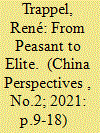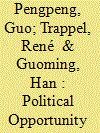| Srl | Item |
| 1 |
ID:
181894


|
|
|
|
|
| Summary/Abstract |
This article contributes to the growing body of research on the role of the Party-state in shaping an emerging post-peasant modernity in rural China, taking developments in Gansu Province as a case. The article first analyses how a political preference for an agrarian elite has been put into recent policies and translates into rural practices. It argues that the “new-type agricultural management subjects,” (which form the core of this elite, should also be considered as a policy instrument designed to promote structural change in Chinese agriculture. This article proceeds to explore the capacity of the new agrarian elite as local development agents in Gansu Province. It focuses in particular on the legitimation of this instrument and its consequences for the structure of agriculture.
|
|
|
|
|
|
|
|
|
|
|
|
|
|
|
|
| 2 |
ID:
145131


|
|
|
|
|
| Summary/Abstract |
An important part of Beijing’s strategy to reduce the welfare gap between urban and rural parts of China has been the promotion of urbanisation. Replacing peasant agriculture with commercial operations of scale is an integral part of this endeavour. This article analyses the implementation of policies meant to transform the structure of Chinese agriculture. It argues that the central government is using a set of very flexible policies, project-based implementation and adaption to local conditions to guide and support an existing dynamic of structural transformation in agriculture. Local governments, in turn, appreciate the flexibility, the political predictability, the potential revenue improvements and the cognitive framework inherent in these programmes. The article is primarily based on interviews with leading cadres at the township and county levels in the provinces of Shandong, Sichuan and Guizhou between 2008 and 2010.
|
|
|
|
|
|
|
|
|
|
|
|
|
|
|
|
| 3 |
ID:
181893


|
|
|
| 4 |
ID:
179946


|
|
|
|
|
| Summary/Abstract |
How does "rightful resistance" take place in contemporary rural China? The continuously evolving village election system, the abolishment of the agricultural tax, and a new insistence on fighting corruption seemingly have created more space for the rural population in China to defend its rights. However, the central state's emphasis on solving the so-called three rural issues (sannong wenti 三农 问题)—raising incomes and welfare for the rural population, modernizing the countryside, and developing industrialized and modern agriculture—in a topdown manner and the continued use of "project-based management" have also greatly decreased the ability of the rural population to influence the agenda of the state and have thereby increased the potential for friction between the local state and its rural citizens. This article is a case study of a dispute between villagers and local cadres about the implementation of a reforestation project. While the case shows that villagers have several avenues for protest, it also hints at the low effectiveness of their protest and the continued existence of important structural obstacles dealing with different levels of the administration, including the atomization of villagers, the volatile nature of their interest coalition, and a profound lack of allies in society.
|
|
|
|
|
|
|
|
|
|
|
|
|
|
|
|